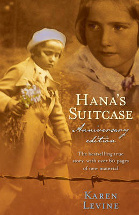Hana's Suitcase by Karen Levine

(Anniversary Edition)Allen & Unwin 2014. ISBN 9781743317679.
When an anonymous Japanese donor decided that Japanese children
should learn more about the Holocaust in an effort to contribute to
global peace and understanding, it is unlikely that they had any
idea of the impact of their philanthropy. The foundation of the
Tokyo Holocaust Education Resource Centre set off a chain of events
which spans three continents, seventy years and continues to educate
and enlighten well beyond Tokyo, or even Japan.
The focal piece of that museum is a very ordinary brown suitcase
which sits in a glass case but which is taken out for the visiting
children to wonder at. For even though it is empty, it has a
remarkable story to tell. Painted on the outside are the words,
'Hana Brady. May 16, 1931, Waisenkind'. Words that spark questions
like 'Who was Hana Brady?' 'Where did she come from?' 'Where was she
going?' 'How did she become an orphan?' 'How did this suitcase get
to Tokyo?' 'Why is it so important?'
Hana's Suitcase provides the answers to those questions and
more, and gives a little girl, who wanted to be a teacher, not only
a voice but the ability to teach children the world over, an
accomplishment beyond her wildest dreams. It is the story of how the
director of the museum, Fumiko Ishioka, felt that she would need
actual objects from the Holocaust if she was to reach and teach
Japanese children about it in a way that would engage them. For
months she wrote letters to everywhere she thought might be able to
offer her something until, at last, she was rewarded with a parcel
from the Auschwitz Museum which contained a child's sock and shoe, a
child's sweater, a can of Zyklon B poisonous gas and a suitcase.
Inspired, she started a quest to find out who owned the suitcase, a
quest which eventually leads her to Hana's brother, George who had
survived and was living in Canada. This book is the story of that
quest, interwoven with Hana's story and photos because the family
photo album was the one thing that George had managed to save and
preserve over the years. It is that story which touches and teaches
so powerfully.
While it is realistic and sad, it is written with a light hand that
realises that its audience does not want to be frightened or
terrified by explicit details - but, nevertheless, it paints a
picture of racism, marginalisation and segregation and what happens
when it is taken to the extreme. It is written in a way that those
who read it and recognise its events in their own lives -
particularly the marginalisation of being different - and respond to
it in that way.
In this anniversary edition, as well as the original story we learn
about its impact on the author, George Brady, Fumiko Ishioka and
children around the world during the years since its original
publication. It has been published in 45 countries, produced as a
play, crafted into several television documentaries, inspired
quilts, drawings, writings . . . George continues a website which has so much
more than a book can contain. Hana is truly a teacher.
A search for Hana's Suitcase will bring up a host of ideas
of how it can be used within the curriculum (Australian publisher
Allen & Unwin have teachers'
notes ) and across the years so even though it is very
suitable for a primary school library (I'm very comfortable giving
it to Miss 9 to read), it also has a place in secondary supporting
the history curriculum. An essential acquisition.
Barbara Braxton